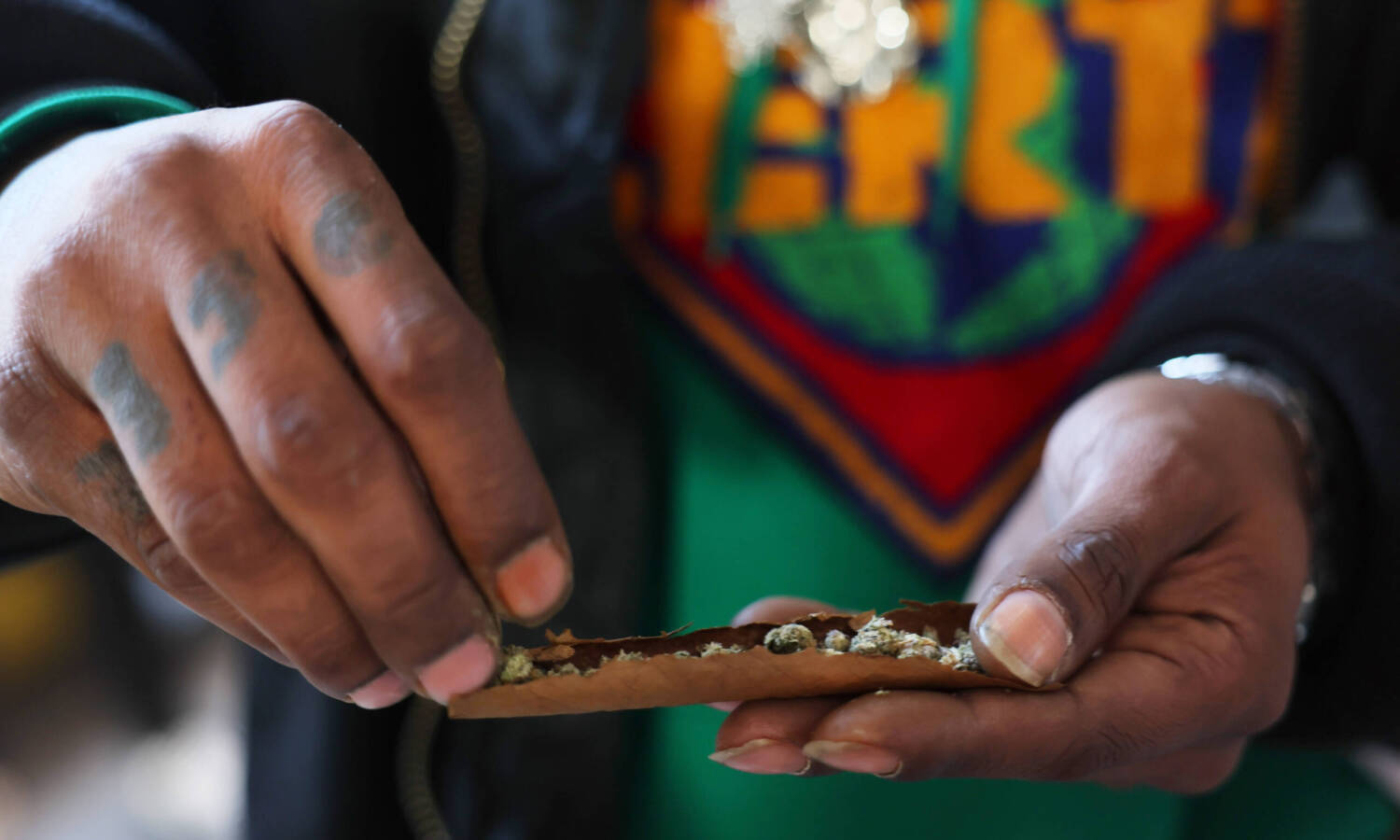Business
Second New York Dispensary Soft Launches, Social Equity Fund Status Up In Air

The state is expected to issue an additional 139 licenses in the coming months for about 900 applicants.
A second New York dispensary is set to open in Manhattan more than two weeks after the state saw its first legal adult-use sale. The “Union Square Travel Agency: A Cannabis Store,” will be located at the former home of an old Chase bank on the corner of Broadway and East 13th Street, across from the Union Square subway station.
The store plans to open in February, but had a soft opening on Friday at another facility (with an entrance at 62 East 13th St.) while the main 5,000-square-foot space is being built out.
Of the proceeds, 51% will go to the Doe Fund, which provides housing, career training and counseling to marginalized populations in New York City. Additionally, the store will only sell products cultivated in the state with a focus on women and BIPOC-owned businesses.

The dispensary will be open from 10 a.m. to 10 p.m. on weekdays and 10 a.m. to 11 p.m. on weekends, seven days a week.
The first legal adult-use dispensary opened Dec. 28 at a former Gap retail store in lower Manhattan near Astor Place. The historic opening marked a long-awaited launch of a state marijuana market that many analysts project could become one of the country’s most promising.
Despite the proliferation of numerous illegal shops throughout the state, Gov. Kathy Hochul announced on Dec. 21 that Housing Works, a minority-controlled nonprofit that focuses on helping those with HIV and AIDS, would be the first of 36 recently licensed dispensaries to begin selling cannabis to the general public. Housing Works has been known for running a small chain of charitable retail outlets.
The state is expected to issue an additional 139 licenses in the coming months for about 900 applicants. The state reserved its first round of retail licenses for applicants with marijuana convictions or their relatives, plus some nonprofit groups.It also planned a $200 million public-private fund to aid social equity applicants with real estate, though its status and how much progress has been made is not exactly clear. Industry stakeholders told Green Market Report in November that there’s been little news on how much progress has been made by fund managers in actually raising capital or getting state monies deposited, so that actual retail spaces can be leased for social equity cannabis companies.
The Dormitory Authority of the State of New York then missed its Dec. 30 deadline to report to the governor, the legislature and the public on its status and details about the social equity program and its relationship with the firm it selected as a fund manager. A DASNY spokesperson told NY Cannabis Insider last week that the agency “will have the report out soon.”

The New York Office of Cannabis Management also extended the license application window for marijuana testing labs to March 31 from its originally scheduled closure of New Year’s Eve.
Chris Alexander, the executive director of the OCM, told the Cannabis Control Board at a public meeting in December that adding that the state is still looking for top-notch lab candidates. “That is a cornerstone of the market that we’re building,” he said.
Alexander also said that the state is rolling out more resources to support the legal marijuana market and to suppress the thriving illicit trade, including:
- A public education campaign called “Why Buy Legal New York.”
- A new verification emblem to be displayed by licensed retailers.
- Ongoing enforcement against unlicensed retailers, including the seizure of more than $4 million in illegal cannabis products from 53 locations by the New York City Sheriff’s joint task force.
Business
New Mexico cannabis operator fined, loses license for alleged BioTrack fraud

New Mexico regulators fined a cannabis operator nearly $300,000 and revoked its license after the company allegedly created fake reports in the state’s traceability software.
The New Mexico Cannabis Control Division (CCD) accused marijuana manufacturer and retailer Golden Roots of 11 violations, according to Albuquerque Business First.
Golden Roots operates the The Cannabis Revolution Dispensary.
The majority of the violations are related to the Albuquerque company’s improper use of BioTrack, which has been New Mexico’s track-and-trace vendor since 2015.
The CCD alleges Golden Roots reported marijuana production only two months after it had received its vertically integrated license, according to Albuquerque Business First.
Because cannabis takes longer than two months to be cultivated, the CCD was suspicious of the report.
After inspecting the company’s premises, the CCD alleged Golden Roots reported cultivation, transportation and sales in BioTrack but wasn’t able to provide officers who inspected the site evidence that the operator was cultivating cannabis.
In April, the CCD revoked Golden Roots’ license and issued a $10,000 fine, according to the news outlet.
The company requested a hearing, which the regulator scheduled for Sept. 1.
At the hearing, the CCD testified that the company’s dried-cannabis weights in BioTrack were suspicious because they didn’t seem to accurately reflect how much weight marijuana loses as it dries.
Company employees also poorly accounted for why they were making adjustments in the system of up to 24 pounds of cannabis, making comments such as “bad” or “mistake” in the software, Albuquerque Business First reported.
Golden Roots was fined $298,972.05 – the amount regulators allege the company made selling products that weren’t properly accounted for in BioTrack.
The CCD has been cracking down on cannabis operators accused of selling products procured from out-of-state or not grown legally:
- Regulators alleged in August that Albuquerque dispensary Sawmill Sweet Leaf sold out-of-state products and didn’t have a license for extraction.
- Paradise Exotics Distro lost its license in July after regulators alleged the company sold products made in California.
Golden Roots was the first alleged rulebreaker in New Mexico to be asked to pay a large fine.
Source: https://mjbizdaily.com/new-mexico-cannabis-operator-fined-loses-license-for-alleged-biotrack-fraud/
Business
Marijuana companies suing US attorney general in federal prohibition challenge

Four marijuana companies, including a multistate operator, have filed a lawsuit against U.S. Attorney General Merrick Garland in which they allege the federal MJ prohibition under the Controlled Substances Act is no longer constitutional.
According to the complaint, filed Thursday in U.S. District Court in Massachusetts, retailer Canna Provisions, Treevit delivery service CEO Gyasi Sellers, cultivator Wiseacre Farm and MSO Verano Holdings Corp. are all harmed by “the federal government’s unconstitutional ban on cultivating, manufacturing, distributing, or possessing intrastate marijuana.”
Verano is headquartered in Chicago but has operations in Massachusetts; the other three operators are based in Massachusetts.
The lawsuit seeks a ruling that the “Controlled Substances Act is unconstitutional as applied to the intrastate cultivation, manufacture, possession, and distribution of marijuana pursuant to state law.”
The companies want the case to go before the U.S. Supreme Court.
They hired prominent law firm Boies Schiller Flexner to represent them.
The New York-based firm’s principal is David Boies, whose former clients include Microsoft, former presidential candidate Al Gore and Elizabeth Holmes’ disgraced startup Theranos.
Similar challenges to the federal Controlled Substances Act (CSA) have failed.
One such challenge led to a landmark Supreme Court decision in 2005.
In Gonzalez vs. Raich, the highest court in the United States ruled in a 6-3 decision that the commerce clause of the U.S. Constitution gave Congress the power to outlaw marijuana federally, even though state laws allow the cultivation and sale of cannabis.
In the 18 years since that ruling, 23 states and the District of Columbia have legalized adult-use marijuana and the federal government has allowed a multibillion-dollar cannabis industry to thrive.
Since both Congress and the U.S. Department of Justice, currently headed by Garland, have declined to intervene in state-licensed marijuana markets, the key facts that led to the Supreme Court’s 2005 ruling “no longer apply,” Boies said in a statement Thursday.
“The Supreme Court has since made clear that the federal government lacks the authority to regulate purely intrastate commerce,” Boies said.
“Moreover, the facts on which those precedents are based are no longer true.”
Verano President Darren Weiss said in a statement the company is “prepared to bring this case all the way to the Supreme Court in order to align federal law with how Congress has acted for years.”
While the Biden administration’s push to reschedule marijuana would help solve marijuana operators’ federal tax woes, neither rescheduling nor modest Congressional reforms such as the SAFER Banking Act “solve the fundamental issue,” Weiss added.
“The application of the CSA to lawful state-run cannabis business is an unconstitutional overreach on state sovereignty that has led to decades of harm, failed businesses, lost jobs, and unsafe working conditions.”
Business
Alabama to make another attempt Dec. 1 to award medical cannabis licenses

Alabama regulators are targeting Dec. 1 to award the first batch of medical cannabis business licenses after the agency’s first two attempts were scrapped because of scoring errors and litigation.
The first licenses will be awarded to individual cultivators, delivery providers, processors, dispensaries and state testing labs, according to the Alabama Medical Cannabis Commission (AMCC).
Then, on Dec. 12, the AMCC will award licenses for vertically integrated operations, a designation set primarily for multistate operators.
Licenses are expected to be handed out 28 days after they have been awarded, so MMJ production could begin in early January, according to the Alabama Daily News.
That means MMJ products could be available for patients around early March, an AMCC spokesperson told the media outlet.
Regulators initially awarded 21 business licenses in June, only to void them after applicants alleged inconsistencies with how the applications were scored.
Then, in August, the state awarded 24 different licenses – 19 went to June recipients – only to reverse themselves again and scratch those licenses after spurned applicants filed lawsuits.
A state judge dismissed a lawsuit filed by Chicago-based MSO Verano Holdings Corp., but another lawsuit is pending.
Source: https://mjbizdaily.com/alabama-plans-to-award-medical-cannabis-licenses-dec-1/
-

 Business2 years ago
Business2 years agoPot Odor Does Not Justify Probable Cause for Vehicle Searches, Minnesota Court Affirms
-

 Business2 years ago
Business2 years agoNew Mexico cannabis operator fined, loses license for alleged BioTrack fraud
-

 Business2 years ago
Business2 years agoAlabama to make another attempt Dec. 1 to award medical cannabis licenses
-

 Business2 years ago
Business2 years agoWashington State Pays Out $9.4 Million in Refunds Relating to Drug Convictions
-

 Business2 years ago
Business2 years agoMarijuana companies suing US attorney general in federal prohibition challenge
-

 Business2 years ago
Business2 years agoLegal Marijuana Handed A Nothing Burger From NY State
-

 Business2 years ago
Business2 years agoCan Cannabis Help Seasonal Depression
-

 Blogs2 years ago
Blogs2 years agoCannabis Art Is Flourishing On Etsy











